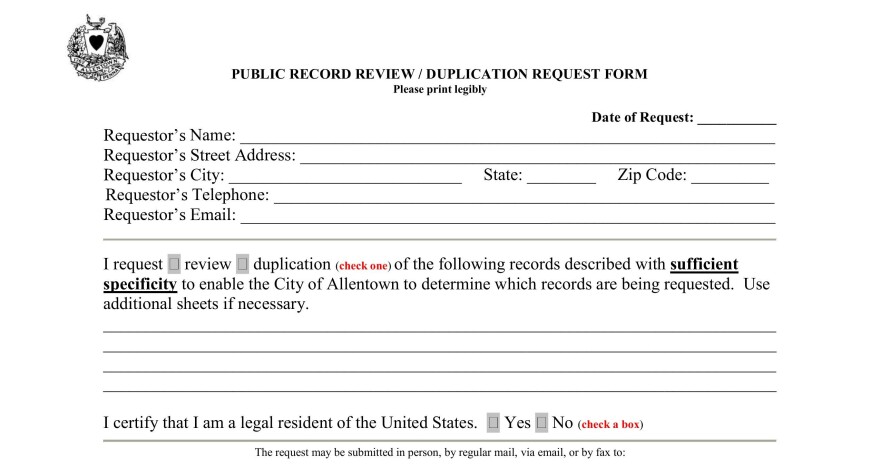ALLENTOWN, Pa. - The City of Allentown’s Right-to-Know form looks slightly different now than it has for the past 13 years.
Missing is a checkmark box it has had from its inception that asks requestors to indicate whether they are a legal U.S. resident. The city quietly changed its form recently after LehighValleyNews.com asked if the box could discourage certain groups of people from asking for data.
- Allentown changed its Right-to-Know form following questions from LehighValleyNews.com about the U.S. residency status checkmark box
- Some transparency experts questioned whether it could be discouraging requests
- The city said it did not collect nor share the data from the box

“I have not seen that check box and I look at a number of Right-to-Know requests throughout the state,” said Paula Knudsen Burke, Pa. attorney for the Reporters Committee for the Freedom of the Press.
Pa.’s current Right-to-Know law was passed in 2008. It improved on the state’s previous rules by making all records presumed to be public. That means an agency does not have to withhold information from the public unless it chooses to.
However, if it does reject a request, it must cite an exemption using the state's Right-to-Know law or another law, regulation, privilege or court decision. The act also established an Office of Open Records, which allows requestors to appeal a denial of records for free. Previously, appeals had to go through a costly and time-consuming court process.
Under Pa. law, a requestor is defined as a legal U.S. resident. Knudsen Burke said such state laws are not uncommon. While many states allow any person to request records, others restrict the ability to acquire documents to U.S. citizens or even to just citizens or residents of that state.
For example, Florida, Colorado, Texas and Wisconsin define requestor as “anyone or any person.” Alabama, Virginia and Kentucky mandate that those soliciting information be citizens or residents of those states or commonwealths.
“We’re not the only ones who limit it in this way,” Knudsen Burke said. “It does happen, and it happens to people who are U.S. citizens but are not citizens of the state in which they wish to file public records requests.”
Records show Allentown’s Right-to-Know form has had the checkmark box since 2009. Sarah Rotz, assistant city solicitor who handles Right-to-Know requests, said Allentown does not collect data gathered from the marked boxes on the requests.
“The city does nothing with the data from that checkbox,” Rotz said in an email.
Prior to the form change, Melissa Melewsky of the Pennsylvania NewsMedia Association said while the old form complied with the state law, the city should be cautious about the potential impact of the question on requests for information, and any possible consequences for transparency and accountability.
Pa. Office of Open Records Executive Director Liz Wagenseller said in an email that she was not aware of any Right-to-Know forms having a chilling effect on anyone requesting records.
Knudsen Burke said the checkmark box was unusual for several reasons, including having to reveal residency status information, which she said can be complex.
“Immigration law is complicated,” Knudsen Burke said. “There’s a whole host of statuses that persons might be in in the United States, such as refugee, asylee, human trafficking victim. So, I think that box could be confusing for someone who is not a citizen and could have a different kind of residency.”
"I think that box could be confusing for someone who is not a citizen and could have a different kind of residency.”Paula Knudsen Burke, Pa. Attorney for Reporter's Committee for Freedom of the Press
Rotz said her records show only one instance of an applicant checking the box indicating they were not a legal U.S. resident. That request for information was denied. She said the data was not reported to any outside agency.
Allentown Mayor Matt Tuerk said requests for information from the city are on the rise. He said the city did not decide to change the form because it was concerned about residents feeling discouraged about requesting information. He said Allentown changed it to encourage people to participate in civic life.
“The removal of the check box is the easiest thing in the world to do,” he said.
Tuerk has cited statistics to highlight the dramatic demographic shift of Allentown from mostly white in the 1970’s to more than 50% Hispanic today and has promoted himself as a new kind of leader for the diversifying city.


